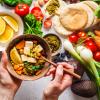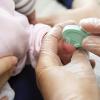Dutch population’s salt and sugar intakes go down, fibre intake goes up
On average, the sugar and salt intakes of the Dutch population have gone down, while its fibre intake has gone up. This is apparent from the latest Dutch National Food Consumption Survey (Voedselconsumptiepeiling, VCP) figures.









